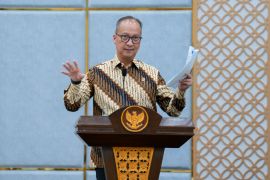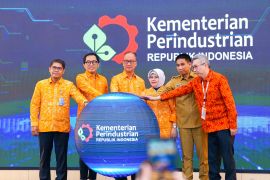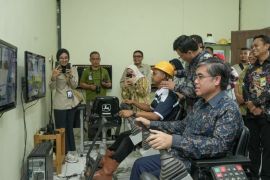He also underscored the need for mitigation efforts to anticipate disruptions in the global supply chain, especially for industrial raw materials, as logistics and export product routes through the Middle East are currently affected by the open conflict.
In a statement on Wednesday, Kartasasmita also reminded the manufacturing industry to mitigate the impact of the Iran-Israel war on currency exchange rate fluctuations, which have led to increased production input prices and reduced the competitiveness of product exports.
Related news: Indonesia should be wary of Israel-Iran conflict's impact
He emphasized that energy is vital for industry, serving both as a production energy source and a raw material in the production process.
"Domestic industry should be more efficient in utilizing energy in its production process. More efficient use of energy from various sources can increase the productivity and competitiveness of industrial products," Kartasasmita stated.
His side encourages industry players to diversify their energy sources used in production, noting that reliance on imported fossil fuels, particularly those from the Middle East, has become increasingly risky amid the ongoing geopolitical conflict.
In the food sector, the minister highlighted the urgency of downstreaming agro products as a strategic response to the indirect impacts of the Iran-Israel war on the global economy.
He pointed out that the conflict has caused a spike in international logistics costs, driven up global inflation, and triggered volatility in the US dollar exchange rate against the currencies of developing countries, including Indonesia.
“These three factors—logistics, inflation, and exchange rates—increase the prices of imported raw materials and food products. We answer these challenges with downstreaming domestic food products," the minister remarked.
He emphasized that the domestic industry should take a role in processing domestic agricultural, plantation, fishery, and forestry products to reduce dependence on imported raw materials for food.
He affirmed that the national manufacturing industry will not only focus on downstreaming the agro sector to produce food products but will also play an active role in innovation to find more efficient food production technology to create higher added value domestically.
Kartasasmita also appealed to the domestic industry to utilize the Local Currency Settlement (LCS) facility to manage inflation in production inputs.
He suggested the industry make the most of Bank Indonesia (BI) facilities to anticipate the impact of the Iran-Israel war on the volatility of the rupiah exchange rate against foreign currencies, especially in countries that have signed the LCS with Indonesia.
Related news: Sri Mulyani voices concern over Israel-Iran conflict's economic impact
Translator: Ahmad Muzdaffar, Resinta Sulistiyandari
Editor: Rahmad Nasution
Copyright © ANTARA 2025












